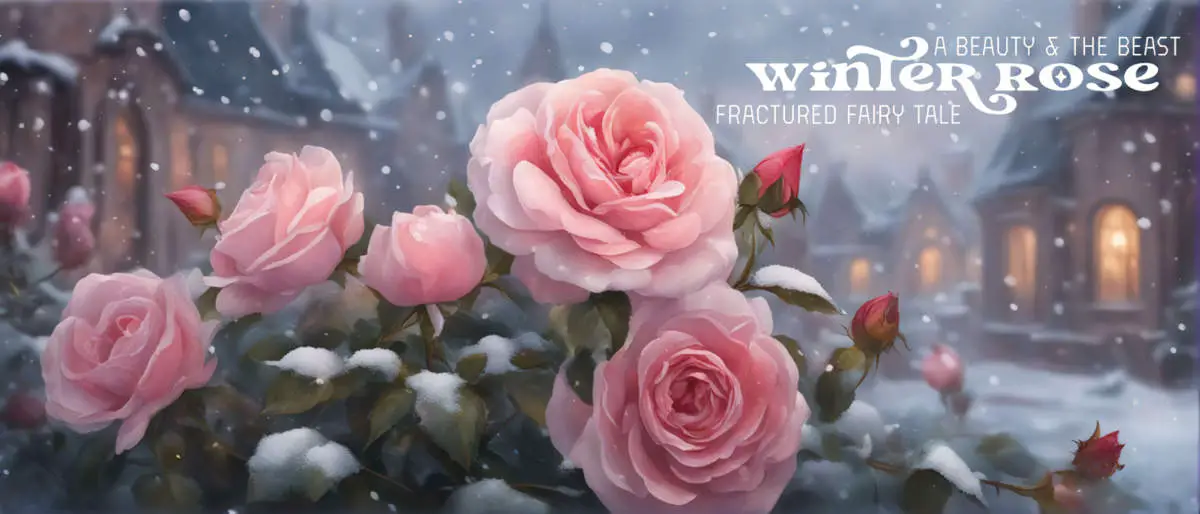FRIDA
A merchant wanted to go to a fair. He asked his three daughters what he should bring back for them.
This time, none of the daughters replied.
Frida, the eldest, had checked the money pot. It was almost empty. Father spent much time away, talking to shippers, meeting with wholesalers. Frida didn’t fully grasp what these words meant, or what her father did to earn those irregular bundles of cash, but if he wanted to play at genie, granting three wishes before each of his escapades, he’d do well to return with the goods.
Frida needed to understand where money came from and how to get it. How did ships get lost? Who seized them? If she knew where to find these people, with their spices and perfumes, with their parrots and peg-legs, she would fill the family cash pot herself. Then the sisters would eat.
“Well? None of you maidens wants a single little thing?”
He always did this. Bernhard Schroder liked to leave town on a high note, leeching optimism from his girls. He required full participation in these ridiculous one-act tragedies, in which Bernhard himself believed in promises.
So the girls asked for impossible things. They clapped with the pretence of anticipation.
At least, they used to.
“Where are you going, exactly?” Frida asked instead.
“There and back to see how far it is,” he replied, surprising no one.
“Ten leagues? One hundred?”
Frida knew their father would not be pinned down on routes and dates. Bernhard cherished the illusion that time is irrelevant; that seasons come, seasons go; everything comes good in the end.
Frida’s full-blood sister, fifteen years of age, kept eyes on their father, ostentatiously unpegging his winter coat. This provoked a tiny panic. “I would like some new shoes, Father,” she said.
“Thank you, Elvira. I will return with a pair of pretty shoes.”
“No,” Frida said. “Elvira’s feet have stopped growing now. She needs boots. A good pair of leather work boots would last ten years.”
Elvira launched into one of her coughing fits and hid both sooty feet under the bench. She’d grown out of her footwear, and not just because her toes were puffy and sore with a mild case of trench foot. Chilblains were a second nuisance, tingling at night, keeping her awake. But if she walked the streets rather than ride in carts, that seemed to get the blood flowing. That much was bearable.
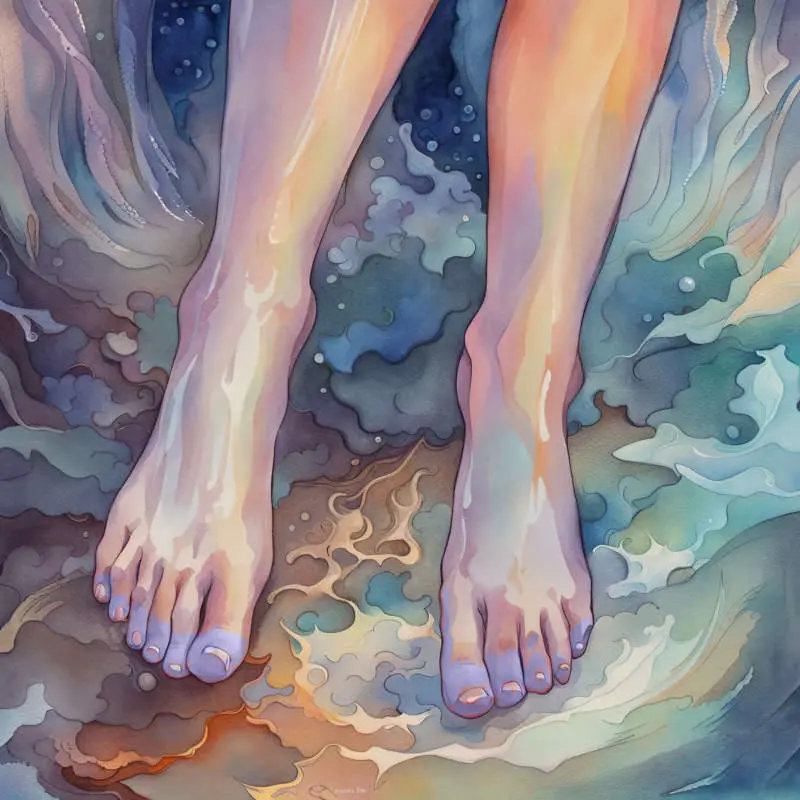
Frida had noticed all this. Bernhard had not.
“Look at Elvira’s feet,” Frida insisted.
Elvira’s feet were out of Bernhard’s view from his position near the door, but he regarded his eldest suspiciously. “Elvira would like shoes, and she shall receive her pretty shoes,” he said. “And I shall buy dainty booties for you too, Frida, though you’re too proud to ask. You two need all the help you can get.” He muttered that last part.
Then he turned to the youngest, who sat in her usual childlike way, knees under chin.
“And you, Beauty. What will you have, sweetheart?”
“I would like a rose,” she said. “A real one, with a smell.”
“My my! What a task! A rose, indeed, and with winter setting in.”
Frida’s heart ached for her twelve-year-old sister. Beauty must have worked him out, too; that this was a fantasy role-play and, if played in earnest, she was bound for disappointment.
Frida suppressed her desire to shove their father out the door. Now he had his coat on, and his riding crop and his hat, she really needed him gone.
She knew how to get rid of him, too.
“Bring me a new dress,” she declared. She stood up and twirled ungraciously, daring her father to look, to really look at her. “You’re right, father. I need help. I get it, okay? I’m not pretty. See this tunic? It’s barely holding together.” She approached her father, edging him nearer to his stage exit, wishing he would see the mismatched patches of cloth. “I request from you, dear father, a French ballgown with petticoats and a hoop. Make it a sparkling turquoise blue, to compensate for these watery, no-colour eyes, inherited from my ugly dead mother. You’d better make it a shiny satin, since my hair is lank and dull.”
“I never said your mother was a hag. I wouldn’t say that, exactly.” Bernhard seemed shocked for a moment, which was the best Frida could hope for. Then he grasped her by the shoulders and squeezed her hard with his large, hairy hands, as if to contain her, and everything inside her. Then he recited his usual axiom—that beauty is in the eye of the beholder. Even plain girls can find happiness, especially if they are good.
“And you, dearest Beauty?” Bernhard released Frida and beckoned his youngest, unaware of the irony. “A cuddle before I go?”
Beauty stepped forward obediently and accepted the long smother, leaning into him, breathing him in, holding her tears.
Outside, Bernhard Schroder mounted his horse. “I’ll bring you all the things!” he promised, as if the neighbours were listening. “You just watch, I’ll bring back a rose.” He said this while glaring at Frida, though it wasn’t Frida who had asked for the impossible gift.
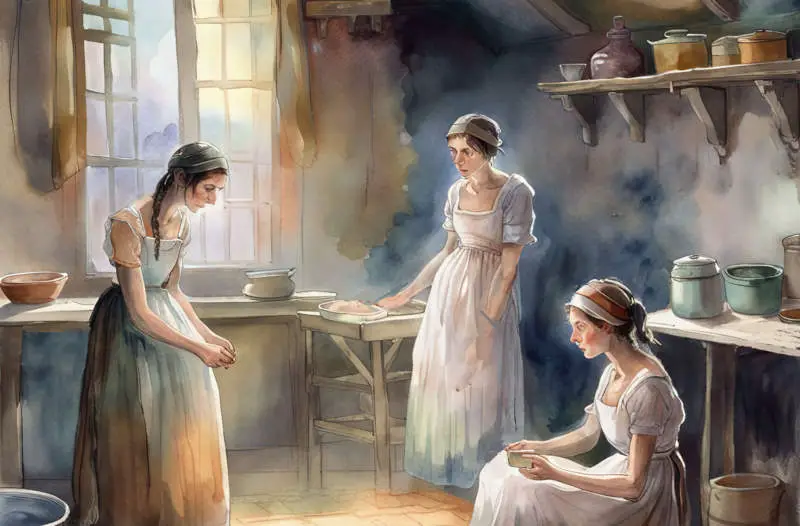
One week later, the Schroder daughters were out of money. They were almost out of food.
“I shouldn’t have asked for the rose,” Beauty said quietly. “I shouldn’t have kept him away.”
Tired of making every little decision, Frida placed their last three potatoes on the table. “Do we eat all three tonight and sleep on full bellies, or do we share one between us and save the other two?”
Simply forming the sentence tired her out. But at least potatoes were real. This was a real decision based on solid things. It was the possibilities and maybes which truly exhausted her: What if Father remained gone for his usual stint of two months? The farmers spoke of heavy snow. Even if Father did plan an imminent return, he and his old horse would have trouble getting home.
Elvira looked right through the potatoes and offered no opinion.
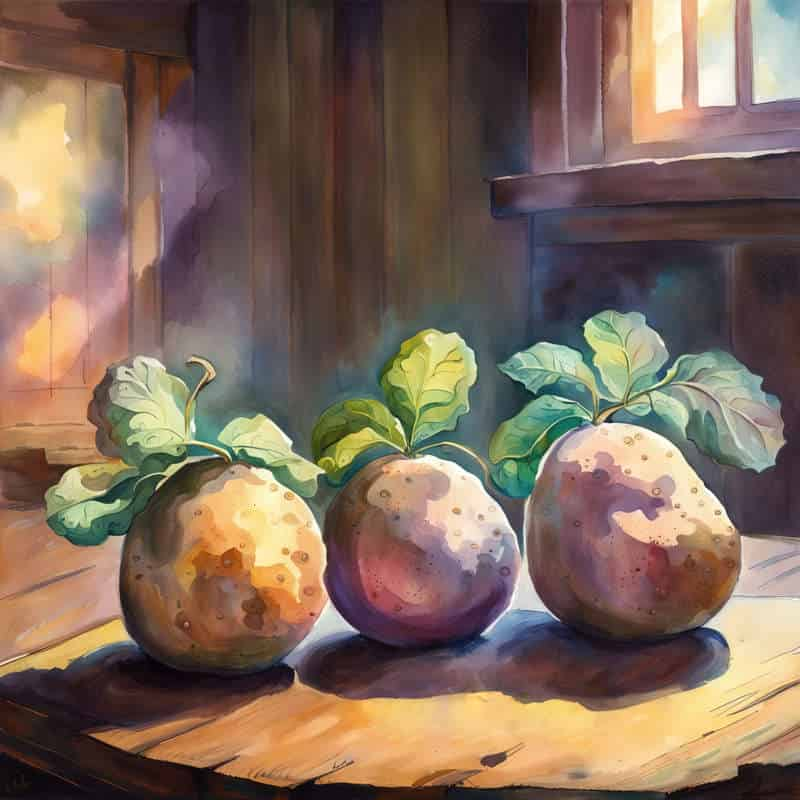
But Beauty seemed galvanised. “Come,” she said, and pulled Frida by the hand. Frida followed her little sister outside to the vegetable garden, with its failed winter crops.
“I discovered something,” Beauty said. “See these greens?” She bent to pick a weed. “You can eat this.” As proof she put the sprig of spiky leaves into her mouth and chewed.
Frida was horrified.
“Don’t worry, I worked out a pattern—weeds that grow in the same soil as vegetables are mostly edible. But the weeds are more hardy, I guess. They survived where our vegetables failed. Here, try this.”
Frida was unbearably hungry, but the sprig held before her was mostly thin roots, clumped with gritty dirt. She’d rather try her luck with the yellow and brown cabbage leaves, which Beauty had left in the ground as a depressing reminder. They remained without heads.
“Please taste it, Freddy?”
Frida accepted the weed. She must pacify her little sister, whose job was to tend the garden, and who had done nothing wrong. No one’s brassicas had come through this season. Some years were like that.
“Mmm.”
“Granted it’s sour, but not sour-sour, not like poison.”
“Beauty, I don’t want you trying any more weird plants, okay?”
Beauty didn’t answer. “The snow’s coming tonight, Freddy. We should gather all the vegetable weeds and make a big salad.”
“Did you hear me, little sister? No more taste-testing the weeds. I’m serious.”
“Help me gather the salad.” Beauty avoided Frida’s gaze. She piled sprigs and dirt into her apron.
Frida dropped to the ground to help. She plucked the least grassy ones, following Beauty’s lead. She wiped her cheek hoping Beauty hadn’t noticed the escaped tear. This was their life now. Her beautiful little sister, forced to eat weeds. Weeds. Like a goat.
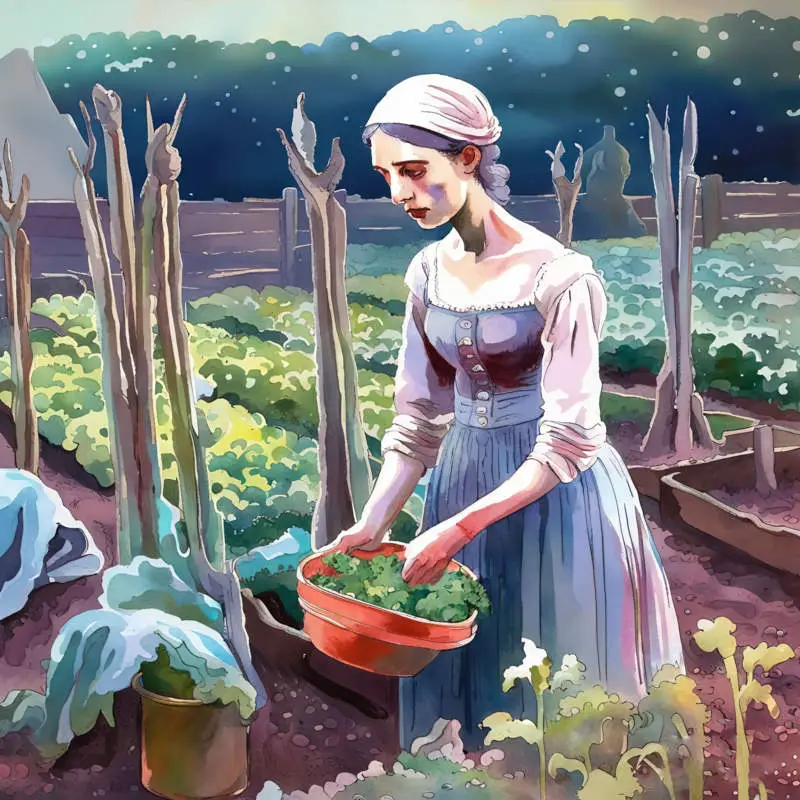
Under the snowy-dark sky, even Beauty blended in to the winter garden. Her tunic needed a wash. Her large eyes, once beguiling, were now sunken into shadowy hollows. That chin, which used to taper into a fine pixie-point, now seemed to jut. She hadn’t brushed her hair. Or maybe she’d been brushing it too much, pulling it out by the clump.
“These have tough stems,” Beauty said, showing Frida a different kind of weed.
“Maybe we can boil them.” Frida’s voice was unexpectedly shaky. A stupid suggestion anyway. If they boiled the weeds their meal would shrink to a slimy nothing.
Beauty snuck concerned glances at Frida’s tears but knew not to mention them. Instead she countered with a smile—a sneaky-secret smile. For a moment Frida dared to hope Beauty had planted an extra crop of vegetables, somewhere on the outskirts of town where Frida hadn’t ventured—a crop which she’d been saving for a desolate time such as this.
“If I were nineteen like you,” Beauty ventured, “I’d marry Walter Becker.”
Frida snorted. A little snot flew out.
“Eew! Don’t do that in front of Walter.”
“Oh shut up, cheeky!” Frida wiped her entire face with one sleeve. “Full of bright ideas, you are.”
“I’m serious.”
Frida felt like crying for real this time. “Oh, I know you are.”
Beauty had seen the tear. She noticed every minor vicissitude in emotion and was skilled in the art of comfort. “Walter’s handsome, don’t you think? I like his dimples.” She poked two fingers into her cheeks. Beauty didn’t need her own dimples. She was born with every other natural advantage.
Frida had thought often about Walter’s dimples. And his black, curly hair. And his compact, lithe body. “Walter is what you call a ‘player’,” she said sagely. “All the girls like Walter Becker.”
“You’re smart in your own way,” Beauty mused, chewing on a rooty sprig, “but you get things back-to-front, big sister. All the girls like Walter. But Walter himself likes one girl back.”
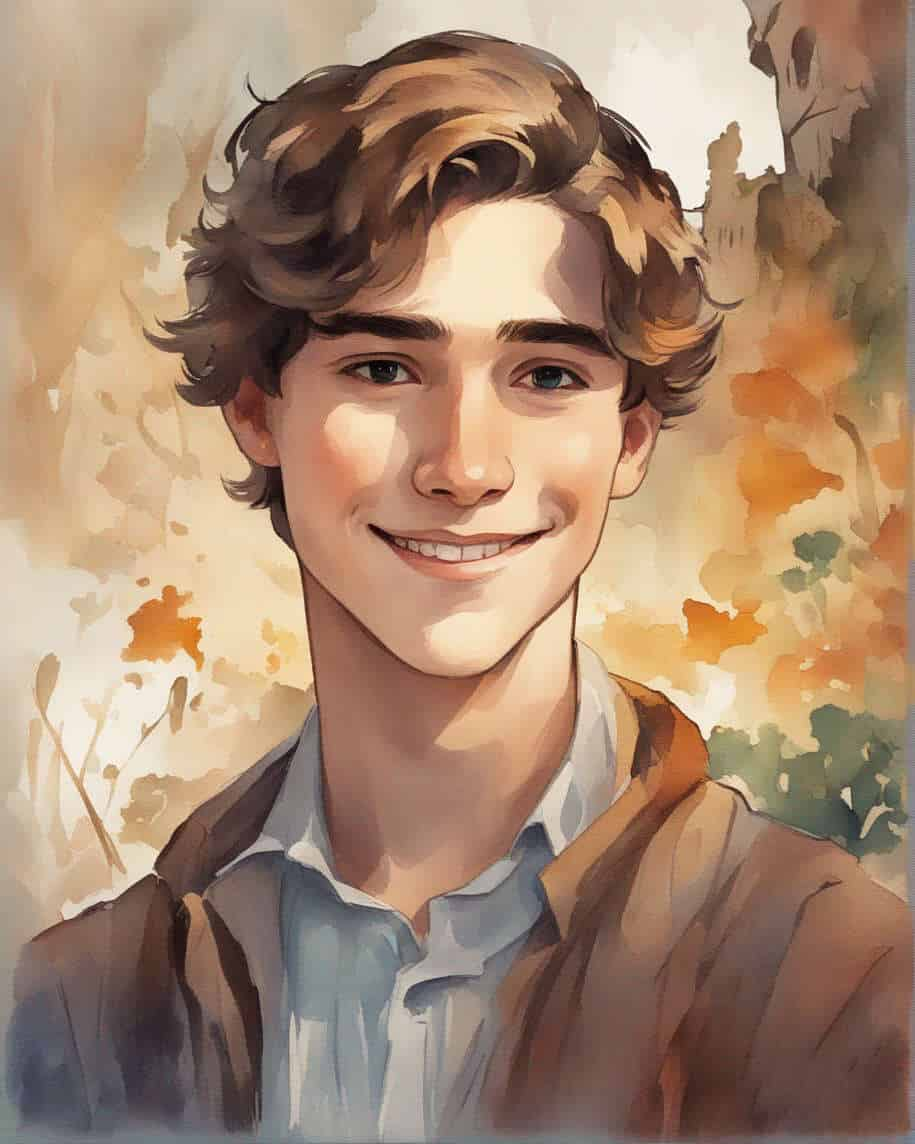
The Schroder daughters dined on salad and whole potatoes that night. They slept well and awoke to a world of white.
Elvira stayed in bed. This was the best place for her. Last night’s sustenance would last longer that way. But Frida tugged on her boots. She had the best boots.
“Where you going?” Beauty asked. “Wait and I’ll help you.”
“I’ve stacked a day’s wood on the stoop,” Frida said. “Take care of Elvira. I’m off to find work.”
“What kind of work?”
“Anything. I can do anything, right?” Frida winced. She sounded like their father, looking to Beauty for reassurance.
Beauty came through. “You can do anything, Freddy. We’re going to be fine.”
But the townspeople did not need their snow shovelled. They’d predicted the snow and pre-gathered wood. Clothes had been washed and dried. Wind had swept the porches.
Old Widow Wagner did need kindling chopped and her fire stoked, but Frida refused to take the spare skillet as payment. It wasn’t a spare.
Daylight waned early and Frida wondered if it was better to return to her sisters with nothing, or to impose upon the Beckers after all.
Respite to husbands the weather may send, but huswives’ affairs have never an end.
The boys and Farmer Becker would be inside. Mrs Becker would be sewing, making candles, carding wool or stuffing feathers into pillows. Little sister Millie would be prancing around cracking jokes, serving regular bowls of broth.
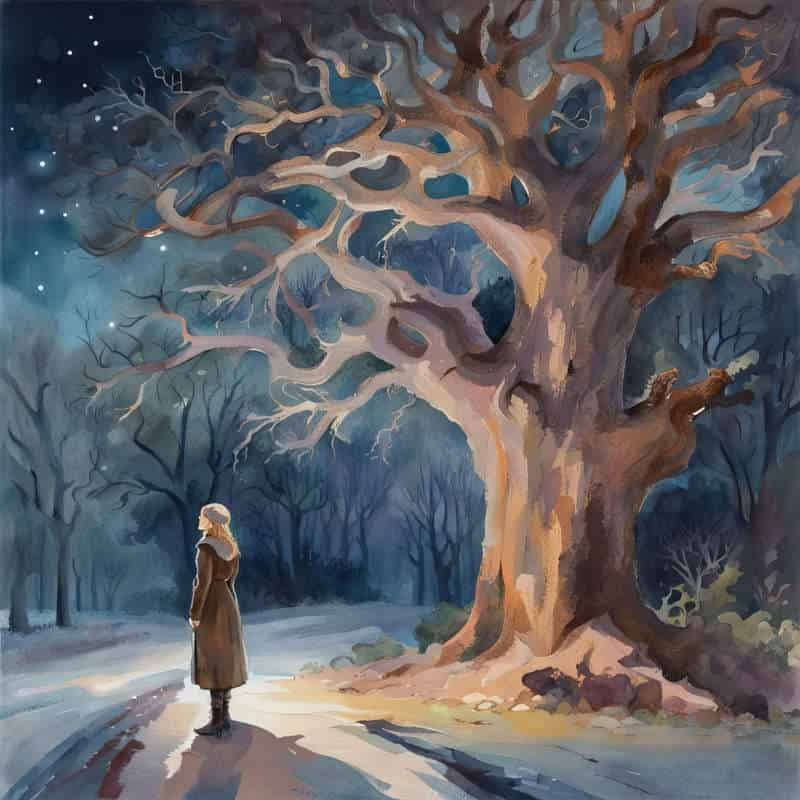
Frida lingered at the oak tree near the fork. If Beauty were here right now she’d encourage Frida to flit across the meadow, if only to catch a glimpse of Walter’s dimples. Indeed, Beauty would be fortified by that. After a long, cold day of disappointments, Frida would sit across from Walter and accept a cup of something. But she wouldn’t beg for a job, because she knew Mrs Becker would give her one that didn’t need doing.
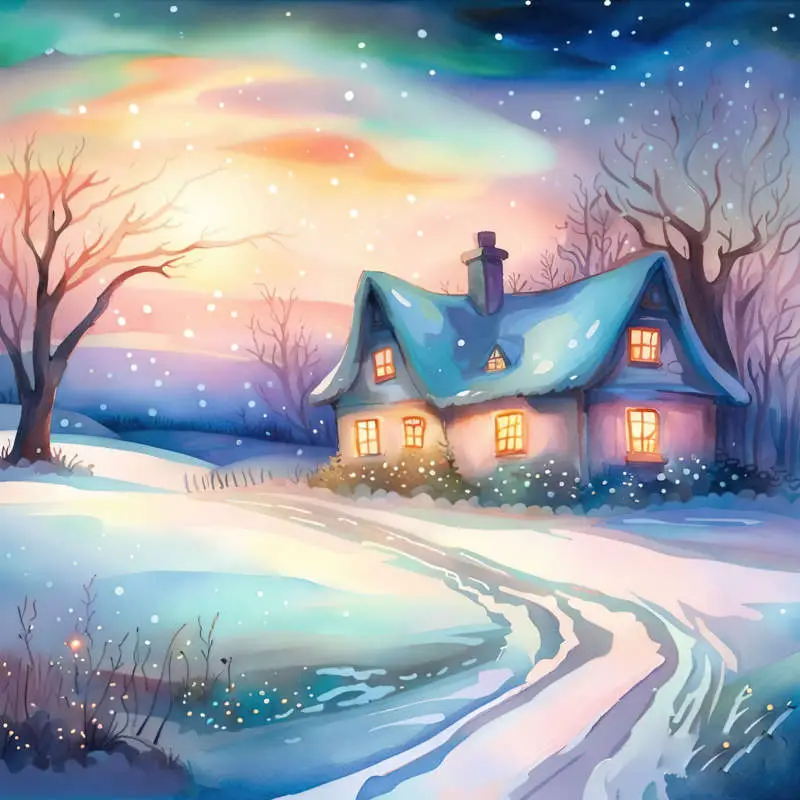
She found the Beckers as she expected to find them, though not cradling cups of broth—she had blundered into a sit-down meal. From the doorway she noticed a table laid with an elaborate dinner: chicken and gravy and roast pumpkin.
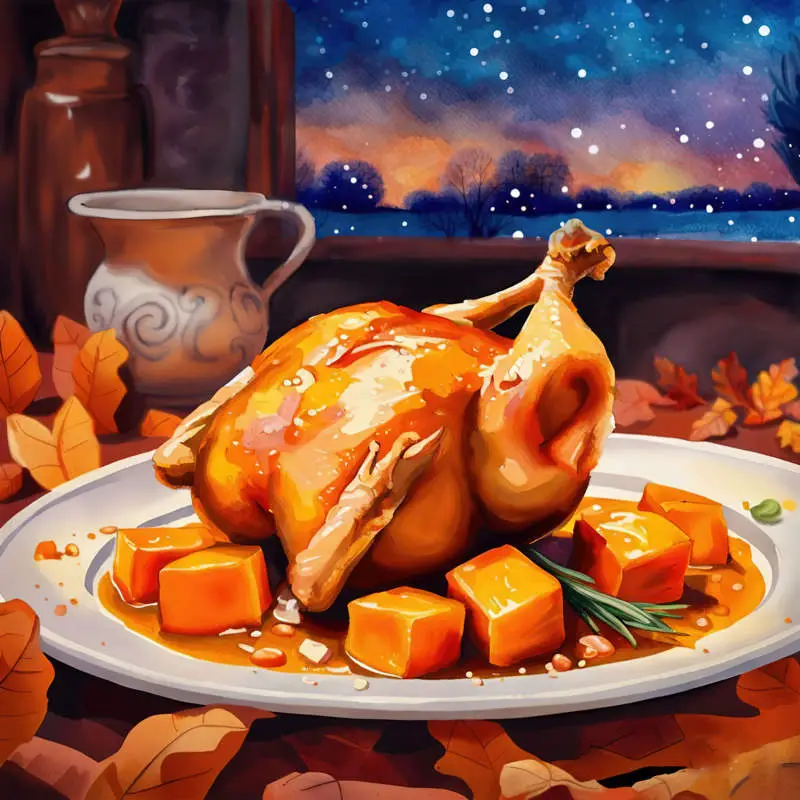
“Sorry,” she said, backing away. “I’m interrupting.”
“You’re coming inside.” Mrs Becker strong-armed Frida into the farmhouse then shooed little Millie off her stool.
That’s how Frida found herself wedged between Walter Becker and his big brother Theo. Without touching elbows, Frida felt the heat come off them. It was quite something.
The warmth made her nose drip. She wiped discreetly and felt her cheeks turn red.
Mrs Becker placed a Christmas-heaped plate before her, though Christmas had been and gone.
“Get it et,” she urged. “And don’t you feel bad. Despite these hollow-leg lads, I’ve got us plenty of scraps. We’ll send you home with dinner for your sisters.”
Frida had nothing to say to that. Nothing but tears lately. But not here, please not here.
“Go on then, before it gets cold.”
Frida ate as daintily as she could, checking Mr Becker now and then. The farmer may not approve of his wife gifting good food to town-girls. He bit down on his pipe and read his book. Eventually he caught Frida’s glance, and returned a reassuring nod.
“Mother’s a fine cook, ain’t she.”
Little Millie made jokes, too impatient to be waiting for answers. “Why are horses so disagreeable? Because they always say nay to everything!”
Frida took note of Walter’s dimples, though she could really only see one, sitting this close from this angle. She’d think on that dimple later.
Mrs Becker walked Frida all the way home. And for her return journey, she took a dog and a son. Walter was quick to volunteer. After a full day inside he must be suffering cabin fever. He also carried the food, stuffed under his coat, keeping it warm.
“When does that father of yours get back?” Mrs Becker asked as the three of them stamped across the snowy field. “Or is that an unknown?”
“We don’t know, ma’am.”
“By crikey, by crikey.” Mrs Becker seemed to be biting her tongue.
Elvira and Beauty were waiting near the door, hungry and anxious, but they’d kept the fire stoked. They ate and they danced and they all fell into bed, keeping each other extra warm.
“Walter’s dimples! Walter’s dimples!” Beauty propped herself onto one elbow. Her eyes shone in the firelight.
“I said goodnight!” Frida wanted to enjoy her own thoughts in peace.
Then sensible Elvira put in her two-penny’s worth. “Mrs Becker would make a fine mother-in-law.”
Elvira was right. With a mother like Mrs Becker, Frida would learn how to make smooth gravy and herb stuffing. She’d study how to sew something more elaborate than tunics. Mrs Becker probably had all sorts of tricks up her sleeve; secret, housewifely tricks which elude girls without mothers of their own.
“What about Walter’s older brother?” Elvira asked, talking through a yawn.
“What about him?” though Frida knew exactly.
“He has dimples too, doesn’t he.”
“Yes.”
“And a fetching smile.”
Frida rolled over and draped an arm across Beauty. Of the three Schroder daughters, only Beauty measured up. But she was too young yet to marry. At this rate, the sisters may not last that long.
For now she could dream. Frida closed her eyes. She saw Mrs Becker before her, welcoming her inside, plying her with food. She worked beside Mrs Becker in her generous kitchen, peeling a mountain of potatoes, chatting about the weather.
She did not think of dimples. The image of Walter’s face made her cold and shivery, and not in a pleasant way.
The Becker brothers were lovely; their parents had made them so.
If only they were ugly as well.
Beautiful Walter came knocking the next afternoon and produced a limp chicken from a sack.
“Mother found her frozen,” he said, though it wasn’t frozen at all. Later, Frida saw it had been twisted at the throat.
He returned the following day with half a pumpkin. Frida invited him in. Her sisters retreated to the back room, keeping their giggles in check. Frida sipped tea with anxious glances out the front window. It would be just her luck for Father to turn up now, when boys are off-limits, even nice ones.
On the third day Frida wore her good dress in anticipation of Walter’s visit. She checked her face in Beauty’s hand mirror, and in the shadows she liked what she saw.
“Why are you ready for church?” Walter asked, brushing her fingertips, accepting the tea. A genuine question for a Friday. But standing in the light of the window, Frida felt ridiculous. She wished she hadn’t bothered.
Later, she threw herself onto the bed. Frida wasn’t normally melodramatic. “This is stupid, stupid, stupid,” she yelled, muffled by the pillow.
Elvira rubbed Frida’s back. “Don’t trust your own eyes, dear sister. You’re plenty good as you are. See yourself through Walter’s.”
But Frida could not listen. “Could he ever love me, looking like this?” Though it wasn’t hers to bury, she wished that ugly mirror would find its way to the bottom of their dead winter garden.
And when Walter arrived the following day with a bag of oats, Frida sent Beauty to greet him instead.
BERNHARD
A man provides for his family. If he can’t provide for his family, he’s not a man. If not a man then what is he? Some kind of beast?
Bernhard Schroder was homeward bound. His horse carried a bolt of cloth for Frida. She could design her own froufrou dress. He’d bought a pair of boots for Elvira. The boots were not well-made but they sharpened at the toe in a feminine manner. Interfering Frida would despise his choice, which is why he picked them.
Bernhard had thus provided for two of his daughters. Women don’t understand this—neither of his wives had understood and nor would his daughters—manliness is an honour and a privilege to be earned, not some badge you get to keep forever. By Christ’s bones, a man proves himself worthy year after year after godforsaken year, trudging through snow with an ailing pack horse in tow, one heavy foot in front of the other, laden down with hard-won gifts.
Now and then, a man is sorely tested. Take now, for example: alone, thirsty and famished on a lonesome prairie, trudging headlong into a goddamn blizzard. He’d tried eating snow. After the initial shock to his remaining teeth, he started with the shakes. He should have purchased matches. Damn those shoes and that bolt of useless cloth.
Bernhard was starting to worry for the horse. He wasn’t worried for himself, though his poor daughters would weep on his grave. Not a pleasant thought. So when the castle revealed its parch mark in the haze, and when he understood he had not in fact frozen solid and floated skyward, he wondered what a man would do in this particular situation.
A man would swallow his pride.
In this weather, even the guards were under shelter. He led his horse through the open gates, along the palace road. He happened upon stables and tied his pack horse next to the king’s stallions. Not even a stable boy could be seen. Just huge black sinewy beasts, steam issuing forth from their nostrils. The stallions seemed to glare.
“Even if I had a carrot, you wouldn’t get it.”
He walked towards the palace itself, guided by the lanterns. Though the grounds were deserted, a team of lamplighters had recently passed through. He checked for their footprints, but snow had fallen since. Then he saw the flames were not lanterns but pit fires. He wondered at their purpose. Perhaps they lit the way for wayfaring strangers lost in the snow. This was a pleasing thought. Bernhard redoubled his enthusiasm and headed for the fires.
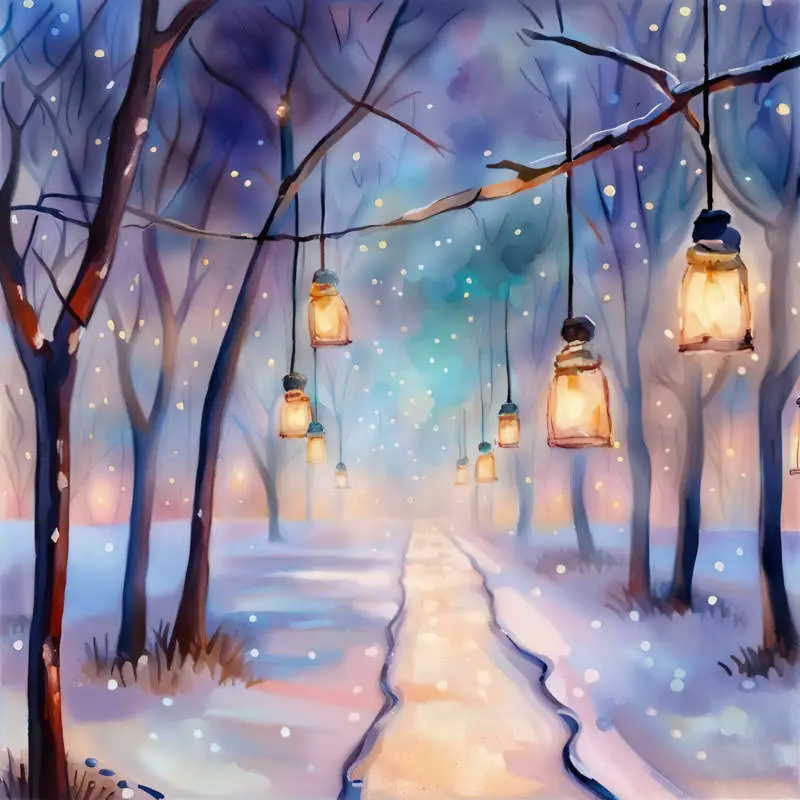
He almost ran into the wall. He’d never seen the like—he didn’t see it now, exactly, rather he kicked it, hard against his toe—a palisade of glass. He’d seen sheet glass before but only in houses—small panes with distortions, and flecks which never wiped out. This glass was perfect. He touched it, and didn’t leave a print. He breathed on it, and failed to leave fog.
He followed the wall as it curved. As he walked the fires beyond grew larger, and he saw what lay inside the giant diaphanous hall: a brilliant summer garden. And wouldn’t you know it, roses. Roses of every colour.
Now he wondered if he really had died after all, because this seemed a lot like Heaven. No, surely not. Deep in his gut, he never really expected to reach the pearly gates.
Instead he reached a door in the glass. Even its hinges were see-through. He pushed on the door and was relieved to gain immediate entry. Inside, the garden was warm as a summer day.
Pink roses! Beauty’s favourite!
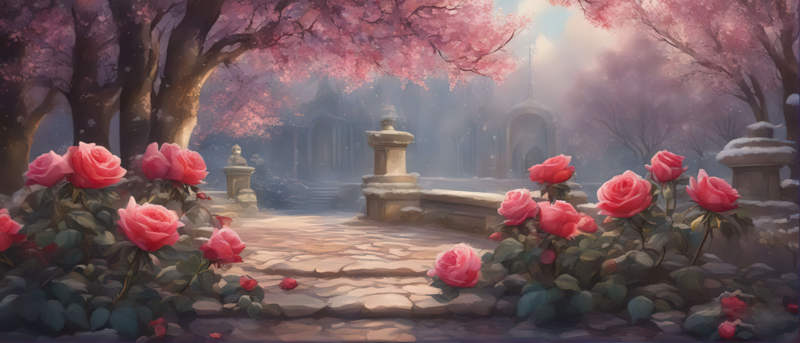
What a fine coincidence. Too much coincidence. Completely unbelievable. This must be Providence, looking after him, restoring his image in his daughters’ eyes. A snow blizzard had led Bernhard Schroder to this magnificent rose garden and he would return to his girls with an actual red rose in hand. A fragrant one, at that. In the middle of winter! Beauty would be overjoyed and Frida would be stunned into silence.
Bernhard inhaled deeply. The entire garden was redolent with rose perfume. It was almost too much. He’d traded colognes before. They tended to leave him with a headache, but now he floated.
He floated among the bushes, mindful of thorns. He didn’t need extra holes in his coat, not with that weather outside. He selected a bloom the shade of healthy blush. He mustn’t squash it before making it home. Three long days of travel stretched before him yet. He opened his rucksack and placed the rose in his empty tuck box.
It was then he caught sight of the shadow. The creature crept up from behind and darkened his path towards home.
CHLOTICHILDA
Beauty’s big sisters were out past cock-shut. Mrs Becker had come instead of Walter today. She dropped a portion of mutton onto the table and didn’t wait for thanks.
“Would you render me a favour, my lovelies?”
Frida said she’d love to make up numbers for the matrons’ choir. Elvira wouldn’t mind tagging along.
“You’re welcome to join us, Beauty,” Mrs Becker continued, “though your little voice is yet to mellow.”
Beauty knew she was no vocalist. No matter; she’d be safe on her own for an hour and a quarter. “I plan to catalogue seeds. And someone should save the fire.”
Alone in the cottage, Beauty sewed tiny bags from cloth scraps, and kept an eye on the stew.
Then she heard a horse. She peeked through the front window.
An unfamiliar man dismounted. His wild beard twitched in the wind.
Beauty ducked from view. She wished her sisters were here. At least she’d bolted the door.
But then she heard her own nick-name, and it was their father’s booming voice.
“Beauty! Oh, Beauty!”
She put on her coat and received him outside. She let herself be gathered into his arms.
“Guess what! You’ll never believe what I found.” Bernhard presented his tuck box.
He’d collected a specimen from the mountain highroad. The cutting was a winter rose; shrivelled and brown and sharp. It may have started out pink. Beauty could not classify it further, though she knew the hellebore family was not related to the rose. Like herself, they carried their own deceptive nick-name.
The box emitted a strong aroma, hereby ruined for transportation of tuck. Wild forest perfume had seeped right into the wood. Unlike a true rose, the hellebore does not smell. This was cheap, trade fair cologne.
“You may keep the box for your jewels,” said the merchant.
“Jewels?” Beauty owned no such thing. Unless he meant that glass-encrusted hand mirror he bought for her once. But that was too big for a box.
Father reached into his pockets and poked around, aiming for suspense. He brandished mysteries inside closed fists. “A pearl necklace for Frida, rubies for Elvira, a diamond ring for you, my love.” He waved his fists like gifts.
The tides must have turned. Their missing ships must have sailed back.
“Whatever can you mean, Father?”
He was making the most of this game. Beauty must now feign disappointment at the knotted handkerchief, at the pebbles, at the acorns.
“Where oh where are my real treasures?” Beauty spoke in the required tones, all the while searching her father’s face. But she couldn’t read him this time.
He seemed to think he’d hit upon his punchline. He was always so happy to see her, and seemed happy now. But also frantic. He kept glancing back at the road.
“Where are your sisters?” He snapped the tuck box shut.
Beauty had never noticed this before, how her father referred to ‘her sisters’.
“Your older daughters, father.” Dodging his question.
“Yes, yes, where is that Frida? And Elvira? Is she much recovered?”
“They’ll be home soon.”
“Hmm?”
Beauty bit her lip. “Come in for meat, Father.” She took Bernhard by the hand, hoping he’d settle.
He seemed to burn with hunger. His nostrils flared like something rabid. Surely he smelt the hearty aroma wafting from the cottage.
But Bernhard would not go inside. He gripped Beauty tight around the waist and pressed his hairy mouth to her ear.
“Listen,” he mumbled. “I stumbled upon a special place; a castle in the sky, so magnificent you won’t believe your eyes.”
Beauty pulled back. Her father’s breath carried the chemical stench of a lengthy fast.
But he would not release her.
“I’m being followed,” he whispered. “I shook them off for now. A prince and his stallions. He’ll make a fine husband, Beauty. Your features will balance his nicely.”
Beauty did not like this game. “What are you talking about, Father? What prince? Where?”
“Coming, coming. I made a promise. He permits me to bid you farewell in private.”
“You’re scaring me. Please, stop. Please. Come inside for sustenance.”
“No no no no no,” Bernhard crooned, pressing one cold finger to her lips. “Don’t be scared, my love. All the riches in the world await you!”
Beauty did not want his acorns.
“You love to garden, don’t you? You spend all summer among plants. Well, my sweet sweet pea, do I have a garden for you! A beautiful garden burst full of roses. Just as you wanted, all year round, without interruption.”
Beauty felt herself wilting.
“You make me so happy, my love. So, so happy. Do you love me, Beauty? Do you?”
Weaker and weaker.
She imagined herself in a garden, as she often did. Though the garden felt desolate now.
GODELIVA
Who would come knocking at this hour? Livvy Becker thought first of the iron rod. She’d never had cause to use it, but it must be here somewhere, wedged far beneath the mattress.
“Lambert!” she hissed.
The man was a heavy sleeper, hence the rod.
“Bert! Rouse yourself! Someone’s come a-pounding at the door!”
“There’s girls outside, ma!”
Of course. The boys were still up, playing cards. It wasn’t really that late. But late enough for a chill winter’s night.
“Girls? Which girls?” she called.
Livvy heard the door creak open, then Theo’s voice, Walter’s soothing. That sounded like young Frida, only this time she was frantic.
Oh, but Elvira.
Elvira had sung without vigour today. Livvy knotted her hank of greying hair into a rough bun and scurried to the anteroom. She was relieved—and confused—to see Elvira with Frida, alive and well, clinging on to her arm.
“Did something terrible happen, my dears? Come in, come in!”
Frida was close to tears. “It’s Beauty. She’s disappeared.”
“What do you mean, disappeared?”
Frida sounded hollow. “She wasn’t home when we got back from choir.”
“Oh, no.” Livvy refused to believe this. “No, that can’t be.”
Not on Livvy’s watch. Not with the older two borrowed for an hour and a bit. Nothing bad can possibly happen when you’re praising the good Lord in church.
Not unless the devil was watching the cottage of course, stalking that beautiful little girl like prey, waiting for the right moment.
“We’ve checked everywhere,” Frida continued. “She’s not in the garden, not in the graveyard. We searched half the world.”
“The well and able are all out looking?”
Frida and Elvira nodded.
“Is anything gone from the house?”
“Just her coat.”
“Well now, that be good news.” Lambert had stepped into overclothes and now reached for matches. “No coat means she had presence of mind to put it on.”
“Now’s no time for smoking, Lambert,” Livvy scolded. But then she was forced to apologise. Her husband was reaching for lanterns.
With a hacking cough and worrisome pallor, Elvira must stay with young Millie inside the Beckers’ farmhouse. Livvy would not back down on this point.
“We’ll scurry back just as soon as we find her. Millie love, boil a bowl of water and be generous with the drops.”
The party of five and two wise farm dogs stepped out towards town. Livvy linked her arm in Frida’s, taking Elvira’s place for now. This gesture caused Frida to weep and Livvy let her, since it didn’t slow them down.
Livvy and Frida kept pace with the boys, striding wide on either side. Lambert forged ahead with the good lantern. At times like these, Livvy felt grateful for her three strapping menfolk.
Not that this exact emergency had happened before. Vagrants took food sometimes, though Livvy suspected wildlife comprised the bulk of the culprits. This township lay en route to nowhere; strangers were rare. Newcomers were noticed.
Plus, snow had fallen all afternoon and since stopped. There would be foot tracks. Everything was in their favour. By logic alone they’d find Beauty safe and waiting at the cottage. She’ll have been gathering seedlings for her collection or some such. She shouldn’t be out in this chill, but with two mothers dead and a father off on jaunts it’s a wonder the girls had not run completely wild.
Livvy wanted to reassure Frida. She wanted to list the many reasons not to worry. The girl had not been kidnapped by strangers. She knew that for certain.
So what was that gnawing in the pit of her stomach?
Livvy never did feel at ease with long silences.
Pfft, pfft, pfft, went their footsteps, across the snowy field.
On the edge of town they were startled by two of the Fischer boys, wielding some kind of pole. The dogs growled and barked.
But it was just a bolt of cloth.
“We found this in the trees.”
Frida knew nothing of it. The cotton print was well preserved, but anyone could have dropped it.
The cottage lights were on, which raised Libby’s hopes. But Frida and Elvira had left them alight. Beauty was nowhere inside.
Libby searched every nook and cranny. She checked under the table, threw off the bedclothes, tossed brooms and rags from the cupboard. She upended the large basin. She even opened the oven.
The men roamed outside. Dogs made the difference.
Theo offered the artefact for Frida’s inspection.
“Father owns a tuck box just like that.”
“Did he take it on his travels?”
“He did. I packed it with bread and cheese.”
“Then I guess someone else dropped his.”
Livvy grabbed the box from her son. Something smelt rotten. Sweet, but sickly.
Frida should sit. She was starting to hyperventilate.
“Someone… something’s been to the house!” she breathed.
Walter confirmed it. “There’s hoof prints fresh out front.”
Livvy shot Walter a warning look. That was no thing to announce, not in front of a distressed older sister.
“Sorry,” he said.
Frida lurched towards the door. “We’ll follow the trail! Beauty’s been lured away! I know it!”
Sadly, Livvy knew it too.
She knew his type. She knew the underside of this base, bastardly rogue. She’d seen the merchant of make-believe take his young daughter’s hand. She kept watch as she sang, diminuendo, from one pew over in church. She’d seen the fingers whiten, and then the girl’s bracelet of red.
“Gather your things,” Livvy ordered, once men and dogs were gone. “Every single damn thing.”
Frida remained confused, so Livvy ransacked the cottage. She hadn’t brought a sack but there was little to salvage; three Sunday tunics and a hand mirror. On second thoughts, she’d leave the mirror.
She’d leave the tunics, too. She’d leave every abject memory to rot with the beast, forever trying to escape from his claustrophobic cage.
Maybe, in time, Beauty might manage the same.

